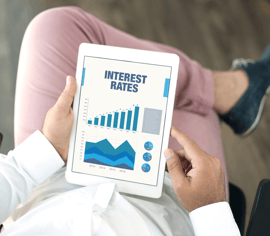 Your home is the single most important, and largest investment you'll likely make in your lifetime. In most cases, home buyers need to obtain a mortgage to buy a home since the vast majority of us don't have hundreds of thousands of dollars to pay cash for a house. But since a mortgage is a legal contract, some of the related terms can be very confusing. You won't want to sign mortgage documents without fully understanding the terminology.
Your home is the single most important, and largest investment you'll likely make in your lifetime. In most cases, home buyers need to obtain a mortgage to buy a home since the vast majority of us don't have hundreds of thousands of dollars to pay cash for a house. But since a mortgage is a legal contract, some of the related terms can be very confusing. You won't want to sign mortgage documents without fully understanding the terminology.
We'd like to help you by clarifying these terms.

Adjustable Rate Mortgage
An adjustable rate mortgage is ideally for those who have better financial flexibility. Both your payments and interest rate fluctuate based on the current market. With this type of mortgage, you can really benefit from a drop in interest rate since you are not locked into a certain rate as you would be with a closed mortgage. On the flip side, due to the nature of this type of mortgage, when interest rates increase, so do your payments, therefor this is not recommended for those on a tight budget.
Amortization Period
An amortization period is the entire length of your mortgage commitment, usually 25 or 30 years but can be less. The longer your amortization, the lower your payments will be as the balance is stretched out over more payments. If you can afford a shorter amortization, such as 15 years, it's best to set yourself up this way since you'll pay your home off much sooner. This period is locked in for your selected term (explained later), but when your term is up for renewal, you can choose to adjust your amortization period at that time to fit your financial situation.
Assets and Liabilities
An asset is an item you own of value that counts toward your financial situation in a positive manner. Cash is considered an asset, as are RRSPs and investment accounts, and any property you own without a loan attached. Liabilities are items that cost you money and reduce your income, such as loans, mortgages, and credit cards. When applying for a mortgage, you should have more assets than liabilities in order to look good to a lender. All assets and liabilities are taken into account when you apply for a mortgage.
Bridge Financing
When you build a new home and currently own another home, you can sometimes take advantage of bridge financing in order to produce the down payment for your new home. This loan is short-term and takes advantage of the equity in your current home. This loan will contribute toward your new home down payment, which is intended to be paid in full upon the sale of your existing home. It simply unlocks the equity in your current home to use as liquid cash.
Closed Mortgage
A closed mortgage is the most common type of mortgage used when buying a home. Both your payment amount and interest rate are locked in for whatever term you choose, usually between one and five years. This also means, in most cases, you're unable to pay extra or a lump sum onto your mortgage without penalties. Some lenders allow you to make a lump sum payment on your mortgage anniversary once a year, up to a certain percentage of the principal balance on your mortgage. This is the most ideal type of mortgage to obtain if you prefer a predictable payment.
High Ratio Mortgage
A high ratio mortgage is one where you're financing more than 80% of your new home's purchase price. Most of us are aware the minimum down payment required to buy a home is 5%, leaving 95% of the purchase to be financed. If you put less than 20% down on your new home, this is considered a high ratio mortgage. Interest rates may be higher as the lender is taking more of the risk, and you'll be required to carry mortgage insurance which can cost thousands of dollars on top of your purchase price. It's a very smart idea to save more for your down payment – you'll benefit from the advantages of a large down payment.
 Term
Term
The term of your mortgage is a period of time in which an agreement is in place between the lender and the borrower. Although your amortization may be 25 years, you may choose to take a five-year term on your mortgage (as an example, the number of years may vary). This means for five years you are under contract with your lender to pay the stipulated payments and interest.
There will be conditions outlined should you wish to break your agreement before your term is up, in which case your lender will require a certain amount of interest paid in order to break the contract. Otherwise, you may continue making your payments until your term is up for renewal. At this time, you may choose to simply renew or renegotiate with your existing lender, or seek out other lenders to find a better deal.
Variable Rate
A variable rate is similar to an adjusted rate in that the interest rate fluctuates with the current market trends; however, in this case, your mortgage payment is fixed. This means the amount of your payment applied to the principal balance of your mortgage also fluctuates.
These are a selection of the most commonly heard terms regarding your mortgage documents. For more information about other terms, feel free to get in touch with your mortgage specialist or a sales agent who can help you understand the entirety of your mortgage documents.




